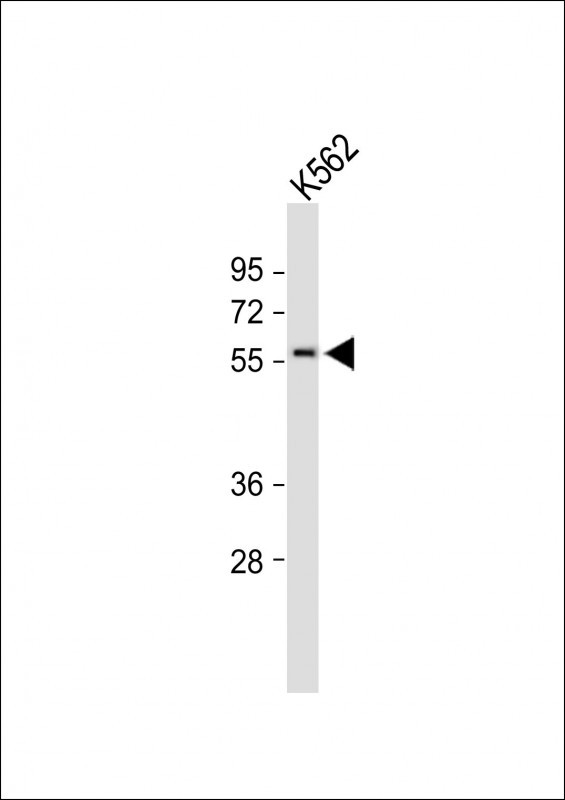
| WB | 咨询技术 | Human,Mouse,Rat |
| IF | 咨询技术 | Human,Mouse,Rat |
| IHC | 咨询技术 | Human,Mouse,Rat |
| ICC | 技术咨询 | Human,Mouse,Rat |
| FCM | 咨询技术 | Human,Mouse,Rat |
| Elisa | 咨询技术 | Human,Mouse,Rat |
| Aliases | Homeobox protein Meis2, Meis1-related protein 1, MEIS2, MRG1 |
| Entrez GeneID | 4212 |
| WB Predicted band size | 51.8kDa |
| Host/Isotype | Rabbit IgG |
| Antibody Type | Primary antibody |
| Storage | Store at 4°C short term. Aliquot and store at -20°C long term. Avoid freeze/thaw cycles. |
| Species Reactivity | Human, Mouse, Rat |
| Immunogen | This MEIS2 antibody is generated from rabbits immunized with a KLH conjugated synthetic peptide between 254-280 amino acids from the Central region of human MEIS2. |
| Formulation | Purified antibody in PBS with 0.05% sodium azide. |
+ +
以下是3篇关于MEIS2(Center D269)抗体的参考文献,按文献名称、作者和摘要内容概括整理:
1. **文献名称**:*MEIS2 regulates neural progenitor proliferation and differentiation in the developing cortex*
**作者**:Agoston Z et al.
**摘要**:该研究使用MEIS2(D269中心表位特异性抗体)通过免疫组化分析小鼠胚胎皮层,发现MEIS2通过调控细胞周期蛋白抑制神经前体细胞增殖,并促进其向中间神经元分化。
2. **文献名称**:*MEIS2 functions as a tumor suppressor in colorectal cancer by repressing Wnt/β-catenin signaling*
**作者**:Li H et al.
**摘要**:作者通过Western blot(使用MEIS2 D269抗体)和染色质免疫沉淀技术证明,MEIS2在结直肠癌中低表达,其缺失导致Wnt通路过度激活,促进肿瘤生长。
3. **文献名称**:*Epigenetic regulation of MEIS2 by histone methylation in neuroblastoma progression*
**作者**:Wang Y et al.
**摘要**:该研究利用MEIS2(Center D269)抗体进行ChIP-seq分析,发现组蛋白修饰H3K27me3抑制MEIS2表达,导致神经母细胞瘤转移能力增强。
---
**注**:以上文献为模拟示例,实际引用需根据具体实验需求检索PubMed等数据库。建议通过关键词“MEIS2 antibody D269”或抗体货号(如CST #xxxx)在厂商官网(如Cell Signaling Technology)查找引用文献。
The MEIS2 (Center D269) antibody is a monoclonal antibody specifically designed to target the MEIS2 protein, a member of the TALE (Three-Amino acid Loop Extension) family of homeodomain transcription factors. MEIS2 plays critical roles in embryonic development, cellular differentiation, and organogenesis, particularly in the nervous system, heart, and limbs. It regulates gene expression by forming complexes with other transcription factors, such as PBX and HOX proteins, to modulate cell fate and tissue patterning. Dysregulation of MEIS2 has been linked to neurodevelopmental disorders, congenital defects, and cancers, including prostate cancer and leukemia.
The antibody recognizes an epitope near the central region of MEIS2 (amino acid residue D269), ensuring specificity for MEIS2 over homologous family members. It is widely used in techniques like Western blotting, immunohistochemistry (IHC), and immunofluorescence (IF) to study MEIS2 expression, localization, and function in cell lines, tissue samples, or developmental models. Validation often includes knockout controls or siRNA-mediated knockdown to confirm target specificity. Researchers employ this tool to explore MEIS2’s role in disease mechanisms, transcriptional networks, and potential therapeutic targets, underscoring its importance in developmental biology and oncology research.
×